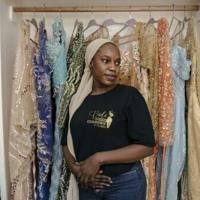At a second-hand store in Senegal’s capital suburbs, Seynabou Sarr is busy fulfilling orders before the Tabaski festival, the largest Muslim festival in West Africa.
Sarr, 30, is busy taking calls while showcasing second-hand boubous – traditional garments worn by men and women for religious or ceremonial occasions.
Tabaski, celebrated by most Senegalese on Monday, is a grand festival that can create financial pressure on families due to the need for new clothes and food.
Wearing the same outfit two years in a row is not encouraged.
“In the past, people hesitated to wear second-hand clothes out of fear of ridicule,” said Sarr, also known as Nabou.
“But now, many are realizing the benefits of second-hand clothing.”
For Tabaski, customers seek boubous made from luxurious fabrics with pearls and embroidery, but without the luxury price tag.
New boubous can cost up to 250,000 CFA francs ($405), a significant amount in a country where the median salary is 54,000 CFA francs ($88) per month.
However, at the boutique, one can find boubous for as low as 90,000 CFA francs or less.
– Second-hand success –
Nabou started her business online in 2018 before opening the physical shop in 2022. She now has over 80,000 followers on TikTok.
Abdou Fall opted for a second-hand tunic this year – an elegant three-piece with exquisite embroidery around the neck.
He purchased it for 60,000 CFA francs, a price much lower than the 130,000 CFA francs it would cost new.
“I wasn’t planning to buy a boubou this year due to other expenses, but the affordable price made me reconsider,” he stated.
Another customer, Matar Sarr, believes that with a modest budget, one can still look stylish like everyone else.
“No one can tell that it’s not brand new. Nobody,” Sarr remarked.
In Senegal, the popularity of second-hand clothes is more driven by financial reasons than environmental concerns.
Khady Djiba is in search of a wedding dress for her sister.
After carefully examining the fabrics, seams, and embellishments, she chooses a tunic with glittering pearls and a long train.
New, the dress would be unaffordable, but for 75,000 CFA francs, Djiba can purchase it from Nabou.
Despite a few imperfections, a bit of alteration and dry-cleaning will make it as good as new.
“It’s a great deal,” she said with a smile.
sjd/nmc/kjm/smw





